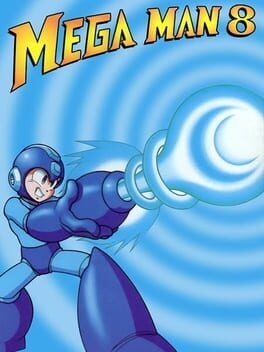Hearing that people think of this as one of the easier games in the series makes it clear to me just how hard it is to pin down game difficulty: I had more trouble with those snowboard levels than anything in Zero. Finding out that the save prompts at the end of each Wily level did not, in fact, indicate that you could turn the game off without losing progress and realizing I'd have to play one of those sections again was agony.
The game's laden with gimmick sections like these, a lot of which are conceptually fun: there's a fully-fledged space shooter with weapon upgrades in the middle of a level! The novelty of this sort of thing, though, is spoiled by their length and their frequency. Each level has one, and as a result, each level is both extremely bloated and at the same time insubstantial: the core gameplay is almost crowded out.
It's a shame that the look of the game is as strong as it is in service to something so mediocre: I can't imagine we'll ever see a platformer this well-animated on this scale again. The music isn't quite as memorable as some of the classic series', but there's a consistent sense of style to it: the whole thing feels a lot like the slick if cold presentation of MvC2.
The dubbed robot masters give the experience so much more character than it'd otherwise have, and are probably the only reason I finished it. The best part of the game, which might be exclusive to the Saturn release, is a gallery of rejected robot master submissions, most of which are children's drawings, each accompanied by gushing commentary from Dr. Wily.
I do want to thank this game for bringing Elmer Fudd Dr. Light into the world. For some people this is not his canonical voice, but for me he is talking like that in the NES manuals.
The game's laden with gimmick sections like these, a lot of which are conceptually fun: there's a fully-fledged space shooter with weapon upgrades in the middle of a level! The novelty of this sort of thing, though, is spoiled by their length and their frequency. Each level has one, and as a result, each level is both extremely bloated and at the same time insubstantial: the core gameplay is almost crowded out.
It's a shame that the look of the game is as strong as it is in service to something so mediocre: I can't imagine we'll ever see a platformer this well-animated on this scale again. The music isn't quite as memorable as some of the classic series', but there's a consistent sense of style to it: the whole thing feels a lot like the slick if cold presentation of MvC2.
The dubbed robot masters give the experience so much more character than it'd otherwise have, and are probably the only reason I finished it. The best part of the game, which might be exclusive to the Saturn release, is a gallery of rejected robot master submissions, most of which are children's drawings, each accompanied by gushing commentary from Dr. Wily.
I do want to thank this game for bringing Elmer Fudd Dr. Light into the world. For some people this is not his canonical voice, but for me he is talking like that in the NES manuals.
